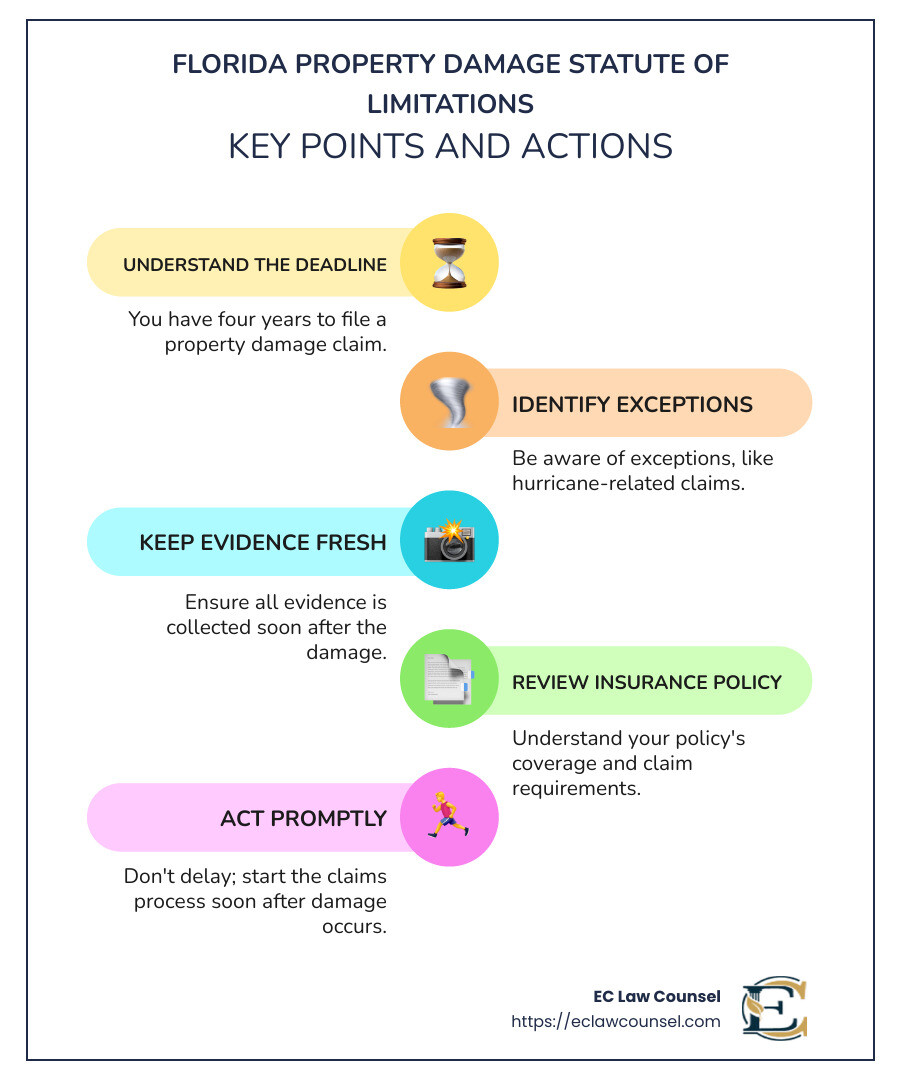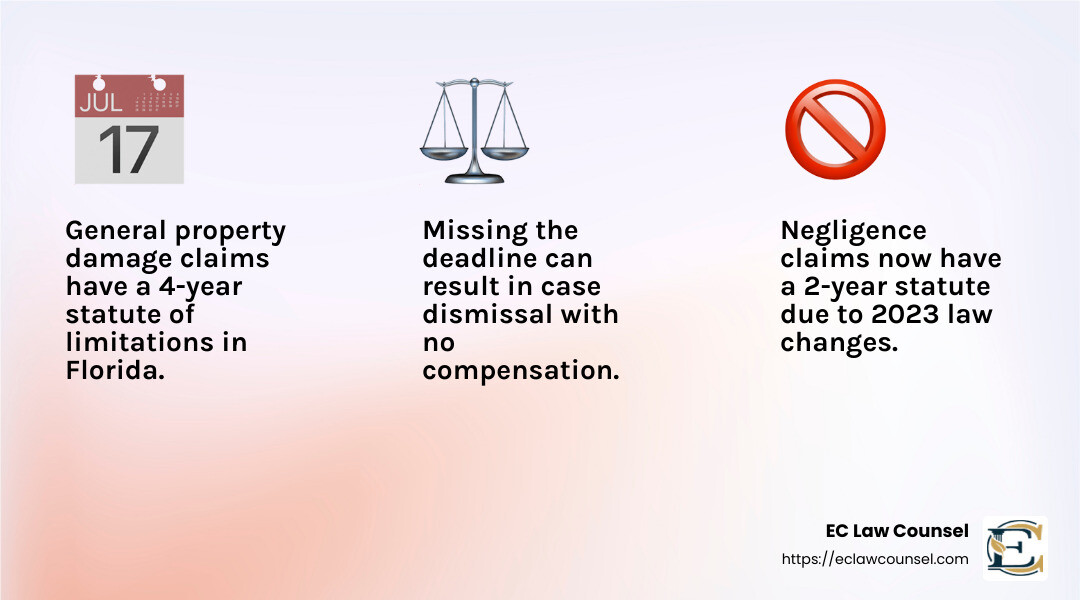4 Vital Facts Florida Property Damage Statute of Limitations
Florida property damage statute of limitations is a term property owners in Florida should be familiar with. Damages to your property—whether from a storm, construction, or an accident—come with a ticking clock. You generally have four years to file a related lawsuit. Miss the deadline, and you risk losing the chance for compensation.
Florida’s legal deadlines exist to ensure the fair handling of claims. They help ensure that evidence remains available and memories fresh. But navigating these timelines can be tricky. Knowing exactly how long you have to act can mean the difference between securing financial help for repairs or dealing with unexpected challenges alone.
Managing property damage claims also involves understanding your insurance policy’s specifics and communicating effectively with your insurer. At EC Law Counsel, we believe that informed property owners can make the best decisions for protecting their assets and securing their right to compensation. Explore with us as we elucidate these intricate rules and offer a path forward.

Understanding the Florida Property Damage Statute of Limitations
When dealing with property damage in Florida, understanding the statute of limitations is crucial. This legal term refers to the time limit you have to file a lawsuit after your property is damaged. For most property damage claims, Florida law provides a four-year window to take legal action. This means you have four years from the date the damage occurred to file a lawsuit against the responsible party.

Imagine a scenario where a neighbor’s tree falls and damages your roof. If you believe the neighbor was negligent in maintaining the tree, you would have two years to file a claim based on negligence.
Missing these deadlines can have serious consequences. If you file after the statute of limitations has expired, the court will likely dismiss your case, leaving you without legal recourse or compensation.
For property owners in Florida, staying informed about these legal timelines ensures you can adequately protect your rights and seek the compensation you deserve. At EC Law Counsel, we’re here to help you steer these complexities and safeguard your assets.
Key Exceptions and Tolling Provisions
In Florida, the statute of limitations for property damage claims is generally straightforward, but there are notable exceptions and tolling provisions that can extend or pause these deadlines. Understanding these nuances can make a significant difference in your ability to seek compensation. Do not rely on them; these are rare and/or meant for extreme circumstances.
Exceptions to the Statute of Limitations
- Absence of the Defendant: If the person or entity you want to sue leaves Florida during the statute of limitations period, the clock may stop ticking. This means the time they are absent from the state doesn’t count against your filing deadline.
- Concealment Within the State: If the defendant hides in Florida or uses a false identity to avoid being served, this can also pause the statute of limitations. The key is proving that the defendant’s actions made it nearly impossible for you to proceed with the lawsuit.
- Plaintiff’s Legal Incapacity: If you were a minor or legally incapacitated when the property damage occurred, you might have more time to file a lawsuit. The statute of limitations may be tolled until you reach legal capacity or the incapacity is resolved.
These exceptions are crucial because they provide additional time to file a lawsuit under specific circumstances. However, consult with a legal professional to determine if these exceptions apply to your case.
Importance of Legal Guidance
Navigating these exceptions and tolling provisions can be complex. Misunderstanding them could lead to losing your right to compensation. It’s vital to seek legal advice to ensure you’re aware of all applicable deadlines and exceptions in your case.
At EC Law Counsel, we aim to provide clarity and guidance on these legal intricacies. Our team is dedicated to helping you understand your rights and options when dealing with property damage claims in Florida.
Property Damage From a Hurricane
Hurricanes, being natural disasters, follow different rules from other types of property damage and their statute of limitations.
Hurricane Milton (Date of Loss: October 9, 2024)
For Hurricane Milton, which made landfall on October 9, 2024, you have approximately 7 months to report your initial claim and 13 months to reopen or file a supplemental claim.
Hurricane Helene (Date of Loss: September 26, 2024)
For Hurricane Helene, which made landfall on September 26, 2024, you have approximately 6 months to report your initial claim and 12 months to reopen or file a supplemental claim.
Important Legal Information
According to Florida Statute § 627.70132, you must report property damage within one year of the date of loss. Additionally, any supplemental claim must be filed within 18 months of the date of loss.
If your claim has been denied, these deadlines still apply. It’s crucial to act promptly to preserve your rights. Remember, failing to meet these deadlines could result in the loss of your right to compensation and placing your property in proper condition. Don’t delay in taking action to protect your financial interests.
If you have any questions or concerns, please don’t hesitate to contact our office. We’re here to help you navigate this process and ensure your rights are protected.
Filing a Property Damage Claim in Florida
When your property in Florida suffers damage, understanding the steps to file a claim is crucial. Let’s break down the process, focusing on insurance policies, reporting requirements, and the proof of loss.
Understanding Your Insurance Policy
Your insurance policy is your first line of defense. It’s a contract between you and the insurance company, detailing what is covered and what isn’t. Policies can vary, so read yours carefully to know the types of damage it covers, such as windstorm or fire damage.
Policies also outline how long you have to report a claim. Missing this deadline can lead to a denied claim. Make sure you understand these timelines to protect your rights.
Reporting Requirements
Prompt reporting is key. In Florida, it’s advisable to notify your insurance company as soon as possible after the damage occurs. This helps ensure that you meet any deadlines specified in your policy and allows the insurance company to start processing your claim.
- Hurricane & Windstorm Claims: For these, Florida law mandates that claims be reported within three years from when the hurricane hits land. This is particularly relevant given the frequency of hurricanes in the state.
Once you report, the insurance company must acknowledge your claim within 14 days and resolve it within 90 days, although this can vary based on the complexity of the claim.
Proof of Loss
After reporting, you’ll need to submit proof of loss. This document details the extent of the damage and the value of the lost items. It’s a critical step in the claims process.
- Documentation Tips: Take photos and videos of the damage. Keep receipts and estimates for repairs. This evidence supports your claim and can speed up the resolution process.
Once you’ve submitted your proof of loss, the insurance company has ten days to start investigating your claim. This investigation determines how much compensation you’re entitled to under your policy.
The Importance of Timeliness
Time is of the essence when dealing with property damage claims. Delays can complicate the process and may result in reduced compensation. By understanding your insurance policy and promptly meeting all reporting and documentation requirements, you can steer the claims process more effectively.
Navigating the intricacies of filing a property damage claim can be daunting, but knowing these steps can make a significant difference. In the next section, we’ll address some common questions about the Florida property damage statute of limitations, helping you further understand your rights and responsibilities.
Frequently Asked Questions about Florida Property Damage Statute of Limitations
How long do I have to file a property damage claim in Florida?
In Florida, the statute of limitations for most property damage claims is generally four years. However, there’s a crucial change to be aware of: for negligence claims occurring after March 24, 2023, the timeframe is now just two years. This means if your property was damaged due to someone else’s negligence after this date, you need to act quickly to file your lawsuit. Make sure to consult with a legal professional to understand which timeframe applies to your situation.
What happens if I miss the filing deadline?
Missing the filing deadline for your property damage claim can have severe consequences. If you file a lawsuit after the statute of limitations has passed, the defendant can request the court to dismiss your case. Courts are typically strict about these deadlines, and if your case is dismissed, you lose the chance to pursue compensation under that specific claim. It’s crucial to file your claim within the allowed timeframe to avoid these legal problems and ensure your rights are protected.
Contact the Property Damage Attorneys With EC Law Counsel For Help
Navigating the Florida property damage statute of limitations can be daunting, especially when you’re dealing with the aftermath of unexpected damage. The window for filing claims is not open indefinitely, and missing these deadlines can mean losing out on the compensation you deserve. That’s where EC Law Counsel comes in.
EC Law Counsel is dedicated to helping you recover the compensation you need to repair and rebuild. With a team that includes former insurance adjusters and underwriters, we understand the tactics insurers use to delay or minimize payouts. Our experience allows us to anticipate these moves and effectively counter them, ensuring that your claim is processed efficiently and accurately.
Our offices in Hollywood and Fort Myers, Florida, are equipped to handle the complexities of property insurance claims. We focus on getting you through the process with as little stress as possible. From the initial reporting of the damage to negotiating with insurance companies, we’re with you every step of the way.
If your property has suffered damage, don’t steer this challenging process alone. Reach out to us for support and guidance. Visit our service page to learn more about the steps you should take after experiencing water damage in Florida and how EC Law Counsel can assist you.
Timely action is key to protecting your rights and securing the compensation you need. Let EC Law Counsel be your trusted advocate in this journey.